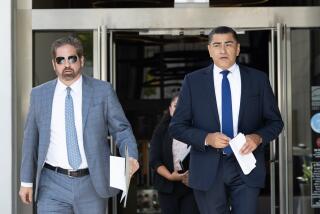Lie Detector Expert Bemoans Act of Congress
- Share via
Imagine spending nearly half a century perfecting your craft and rising to the top of your profession, then awakening one day to find that your field has been virtually eliminated by nothing less than an act of Congress.
Chris Gugas does not have to imagine the nightmare. For him, it has come true.
Since first encountering a lie detector while a security guard in the Marine Corps during World War II, Gugas has spent 47 years building his business, Professional Security Consultants in Hollywood, and spreading his own gospel on the reliability and beneficence of the polygraph.
He even wrote a book, “The Silent Witness,” detailing his examinations of actress Terry Moore on her claims to have secretly married Howard Hughes and James Earl Ray on whether he fired the shot that killed Dr. Martin Luther King Jr.
There were countless examinations of people who claimed they were innocent of murder, rape, arson, child molesting and other crimes, and often were.
But with Gugas, as with the other 5,000 members of the American Polygraph Assn. he helped establish, most of the examinations were less dramatic. A typical subject for a polygraph might be an applicant for a job with a check-cashing firm or an employee with a company plagued by internal thievery.
But no longer.
On Dec. 27, the Employee Polygraph Protection Act took effect and, according to Gugas, started the death knell tolling for the private polygraph industry.
“This has completely wiped out 50 years of work in the polygraphy field,” Gugas said.
Gugas said the legislation cost his business $100,000 in 1988, even though it did not take effect until four days before New Year’s.
“When the bill passed on June 27, most of my clients decided they just didn’t want to get involved (with pre-employment polygraph tests any longer) and they just cut me off,” Gugas said.
Many employers have turned to written or symbolic psychological tests to ferret out potential thieves and security risks.
Forced to subsist on occasional court-case work, “I don’t think I’ll be able to stay in business this year at all.” He said dozens of his colleagues across the country already have closed down.
“Our bread and butter is made by pre-employment screening and routine (employee) screening. The percentage is the same for any examiner, about 80%. The rest is civil cases brought to us by attorneys and police work (testing witnesses or suspects),” Gugas said.
The Employee Polygraph Protection Act bars most employers from requiring or pressuring employees or applicants to submit to a lie detector test and shields employees from being fired or punished for refusing.
Violations carry fines up to $10,000.
The bill was sought by labor unions and civil rights groups who claimed that the polygraph is so unreliable that its use in determining who is hired and fired should be banned. Gugas claims that it was a political deal between the Teamsters, the American Civil Liberties Union and Sen. Edward M. Kennedy (D-Mass.) that was accepted by the former Ronald Reagan Administration for its own political reasons.
Congress exempted governments, which have their own polygraphers, from the law and gave limited exceptions to armored car and security alarm companies and private employers of security guards at power stations, public water supply or toxic and radioactive waste facilities.
Also exempted were public transportation agencies, businesses that handle cash, negotiable securities or precious commodities and makers of controlled drugs.
The kinds of abuses of workers targeted by the law are the exception, not the rule, Gugas insists.
“It’s (polygraph testing) done so much good, but our press relations have been rotten. You can’t refute articles saying the polygraph is no good,” he said.
Many doubt the accuracy of the machine, which measures stress through heart rate, blood pressure, respiration and changes in the electrical resistance of the skin due to perspiration.
Polygraph results can only be admitted in court when both sides agree, but Gugas claims his craft, “part science, part art,” is accurate 97% of the time.
“It’s not perfect, but it’s the next-best thing for an employer to make sure he’s getting an employee who will do an honest day’s work and isn’t a drug addict or alcoholic.”
Business, deprived of the polygrapher’s skill in weeding out the dishonest, either before or after employment, will see employee theft soar, Gugas warned.
Gugas was one of the first in his profession and among the first to fight to save it. Soon after Congress enacted the law, Gugas sued to have it declared unconstitutional on grounds it discriminated against lie-detector examiners and interfered with the rights of the states to regulate the industry.
Thirty states have laws to protect the rights of employees subjected to polygraph tests, he said.
His challenge never really got off the ground. U.S. District Judge Irving Hill dismissed the suit Jan. 17 at the request of the government. Hill accepted the government’s contention that the law regulates the employer-employee relationship and could not be challenged by a third party--the polygraph industry--indirectly affected by the bill, even if it means extinction.
Gugas and a group of fellow polygraphers left court expressing everything from bitter outrage at the judge to fatalistic acknowledgement that their way of life was ending.
The polygraphers face either an appeal or trying to find a business owner willing to join the case so it can be refiled.
More to Read
Sign up for Essential California
The most important California stories and recommendations in your inbox every morning.
You may occasionally receive promotional content from the Los Angeles Times.













